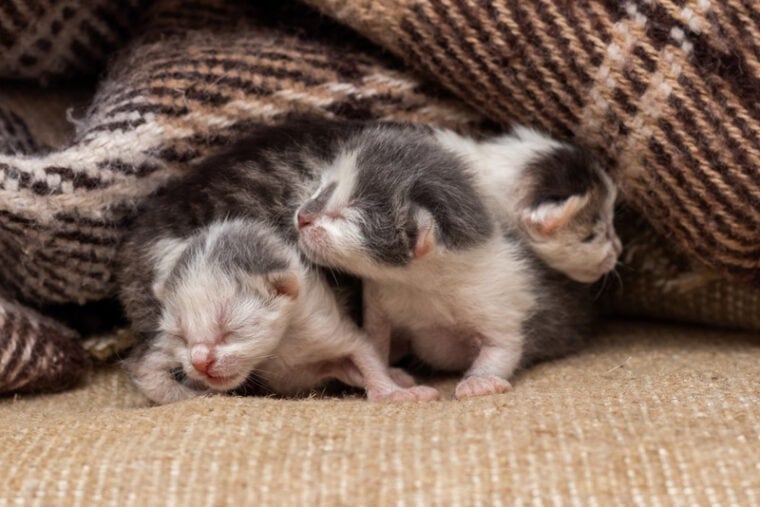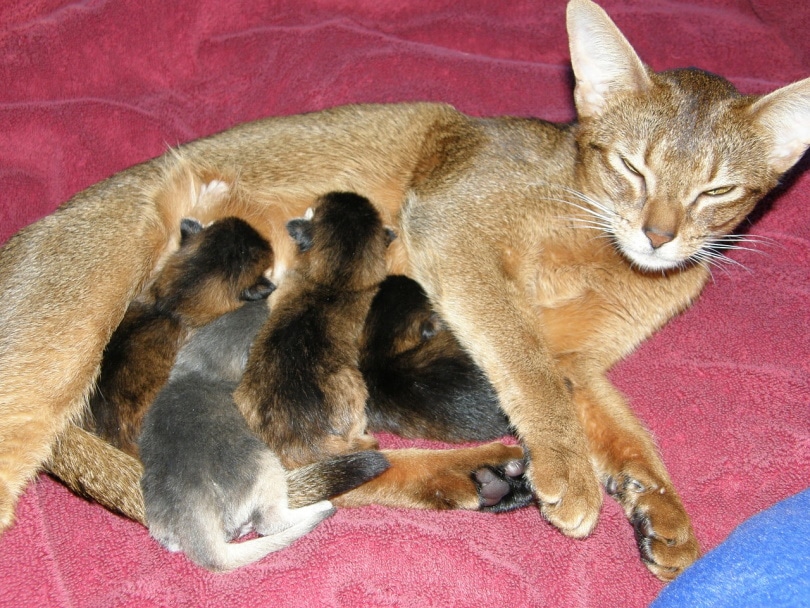
Witnessing a group of kittens being born is an exciting and memorable experience, especially if it’s your feline that is giving birth. If you’re like most cat parents, your first inclination once you see newborn kittens is to pick them up and cuddle them. However, it’s never a good idea to touch newborn kittens. Learn more about why this is the case and when you can start handling the new kittens in your house.
Why It’s Not a Good Idea to Handle Newborn Kittens
The first couple of weeks of a kitten’s life are extremely precarious. Their eyes are not yet opened, and they rely on their mothers for everything in order to survive during this time. A mother cat spends all her time caring for her kittens by keeping them warm, making sure they get fed every 2 to 3 hours, and helping them relieve themselves. During this time, mommas and their babies create a strong bond that helps them work as a team as the kittens grow older.
Mom cats also tend to be stressed out and want to make sure their babies are safe and secure. Therefore, they usually don’t appreciate people and other animals getting near their nesting area. If you handle the newborns too early, it can interfere with the bonding that the mom and babies are trying to build. Transferring your scent to the kittens may even stress out the mother, and her reaction could be as serious as neglect of the handled kitten.

When Handling Newborn Kittens Is Necessary
There are certain scenarios when it might become necessary to handle a newborn kitten. These instances include:
What About Orphaned Kittens?
If you find a litter of orphaned newborn kittens outside or one or more of your feline’s kittens seem to have been “abandoned,” move them to a safe and warm place, and then take them to a veterinarian. A box or kennel outfitted with blankets for warmth and comfort will help on the ride over. Your veterinarian can provide you with instructions if it’s possible for you to take care of them at home. If the kittens need specialized care, your vet should offer the guidance needed to access that care.

When You Should Start Handling Kittens
It’s recommended that you don’t start handling your mother feline’s kittens until their eyes open, about 2 weeks after birth. Until then, you can simply fawn over them with your eyes and provide them with love via your heart. When you are able to start handling the babies, do so gently and only with their mother’s permission.
Once the kittens’ eyes are open and they start to use the bathroom and eat on their own, chances are that their mom will appreciate a break from the action so you’re more likely to get permission. You will know if momma cat doesn’t want you picking up her babies because she’ll hiss, try to get between you and her brood, and/or meow in protest. If she ignores your attempts to pick up a baby or happily sits by and watches, you should be good to go.
Tips for Properly and Safely Handling Kittens
There are a few things that you should and should not do when handling small kittens to ensure their health and safety as they age. First, always consider the mother cat. She should always know where her kittens are, so only handle them in her presence, and refrain from taking them to another room or removing them from the home unless medically necessary. Here are other tips to keep in mind:

A Final Recap
Kittens are adorable and there is no denying it. When they’re hanging around your house, it can be tempting to pick them up and give them love. However, you must give the babies time to adjust to life and bond with their mothers before human intervention takes place. Be patient—there will be plenty of time to handle and play with those amazing kittens!
Featured Image Credit: MVolodymyr, Shutterstock





